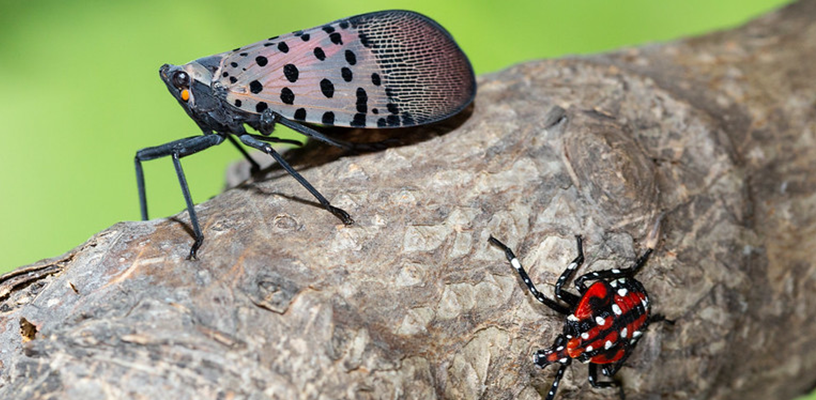 The spotted lanternfly (SLF), Lycorma delicatula, is an invasive insect that was first detected in Pennsylvania in 2017. Since then it has spread to surrounding states, including most recently, North Carolina, where it was first detected in Forsyth County in late June. It has the potential to greatly impact grapes, hops, orchards, native trees and ornamentals by feeding on sap and fruits while secreting a sticky “honeydew” which facilitates the growth of sooty mold. Early detection of newly established populations is crucial in order to limit the spread and abundance of this pest. Professionals need to develop skills to recognize and distinguish between each stage in the SLF lifecycle and correlate Integrated Pest Control (IPM) strategies that are appropriate for the time of year and stage of development. Understanding the role that humans play in the spread of SLF by transporting egg masses and infested materials to new locations is essential to preventing new populations and protecting North Carolina agriculture, viticulture, native trees, and ornamentals. Learn all this and more by attending a 3-hour interactive workshop led by N.C. Cooperative Extension professionals.
The spotted lanternfly (SLF), Lycorma delicatula, is an invasive insect that was first detected in Pennsylvania in 2017. Since then it has spread to surrounding states, including most recently, North Carolina, where it was first detected in Forsyth County in late June. It has the potential to greatly impact grapes, hops, orchards, native trees and ornamentals by feeding on sap and fruits while secreting a sticky “honeydew” which facilitates the growth of sooty mold. Early detection of newly established populations is crucial in order to limit the spread and abundance of this pest. Professionals need to develop skills to recognize and distinguish between each stage in the SLF lifecycle and correlate Integrated Pest Control (IPM) strategies that are appropriate for the time of year and stage of development. Understanding the role that humans play in the spread of SLF by transporting egg masses and infested materials to new locations is essential to preventing new populations and protecting North Carolina agriculture, viticulture, native trees, and ornamentals. Learn all this and more by attending a 3-hour interactive workshop led by N.C. Cooperative Extension professionals.
Professional Development Credits:
- NC Landscape Contractors - 3.0 Landscape/Technical Credits
- N.C. Pesticide License - 3.0 D,L,N,X,G and O
- N.C. Environmental Education - Criteria II (weather permitting), Criteria III, Continuing Education
- ISA Certified Arborist 3.0
-
Original source can be found here.





 Alerts Sign-up
Alerts Sign-up